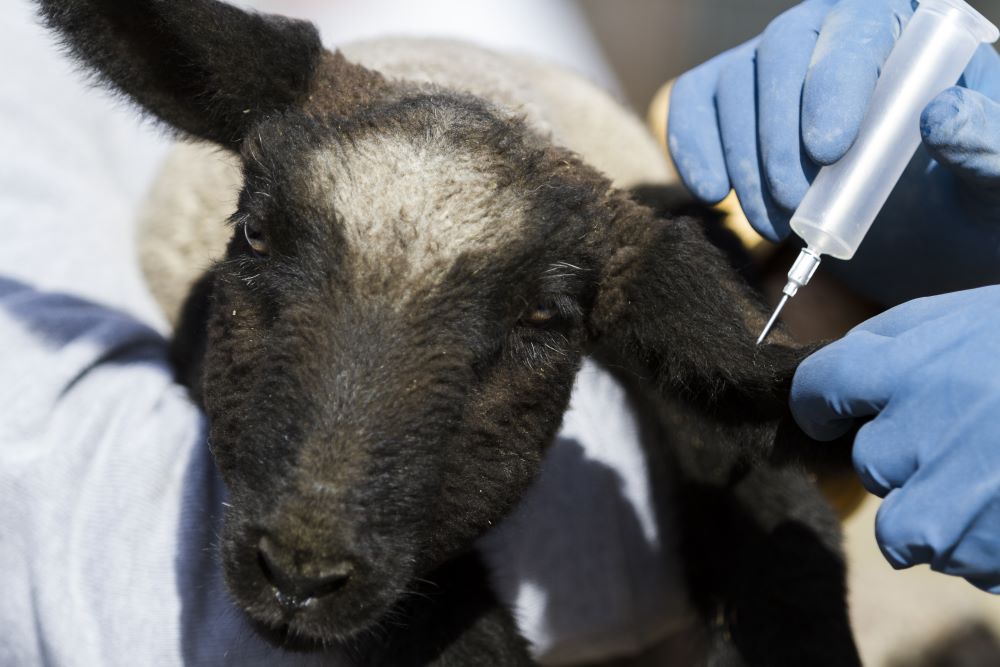From £6.99

Protecting Your Flock: A Beginner's Guide to Lamb Vaccination
If you are a first-time sheep owner, the thought of vaccinating your lambs may be daunting. Vaccination is a vital part of keeping your flock healthy, and knowing when and how to vaccinate your lambs is key. In this blog post, we will provide a comprehensive beginner's guide to lamb vaccination so that you can rest assured that your lambs are protected.
Why Vaccination is Important for Lambs
As a farmer or livestock owner, you are responsible for ensuring the health and well-being of your sheep flock. One of the most important ways to protect your sheep is through vaccination. Vaccines can help prevent or lessen the severity of diseases that can potentially harm your sheep.
Newborn lambs are particularly vulnerable to disease, which is why it is essential to vaccinate them as early as possible. Many of the vaccines available today are designed to be given to lambs in their first few months of life.
When lambs are born, they receive antibodies from their mothers through colostrum, which helps protect them from disease. However, this protection wanes over time, leaving the lambs vulnerable. Vaccination can help fill the gap, ensuring that lambs are protected against the diseases they are most likely to encounter.
In addition to protecting your own flock, vaccination is also an essential component of disease control and prevention within the larger sheep industry. By vaccinating your sheep, you are doing your part to keep the entire industry healthy and prosperous.
In short, vaccination is a critical aspect of sheep health and welfare. It helps protect individual animals and the industry as a whole, ensuring that your flock can continue to thrive for years to come.
Common Vaccines for Lambs
When it comes to protecting your flock of lambs, vaccination is an essential part of their overall health and well-being. As a farmer, ensuring that your livestock is vaccinated is crucial in preventing and controlling the spread of infectious diseases. Here are some common vaccines for lambs that are widely used in the UK.
1. Clostridial vaccines: Clostridial diseases, such as tetanus and pulpy kidney disease, can be fatal for lambs. Vaccines like Heptavac P Plus and Covexin 10 provide protection against a range of clostridial diseases and are commonly administered to lambs.
2. Pasteurella vaccines: Pasteurella is a bacterial infection that can cause pneumonia and other respiratory issues in lambs. Vaccines like Ovipast Plus and Lambivac provide protection against Pasteurella multocida and Mannheimia haemolytica, two common pathogens responsible for respiratory diseases in lambs.
3. Ovine Pulmonary Adenocarcinoma (OPA) vaccine: OPA is a contagious lung tumor that affects sheep and can have a significant impact on their productivity. Vaccines like Ovarvac and Gudair are available to protect your flock against OPA and should be considered if the disease is prevalent in your area.
It's important to note that vaccines may need to be administered at specific ages and intervals, so consulting with your veterinarian is recommended. Additionally, always ensure that the vaccines you are using are licensed for use in the UK. By vaccinating your lambs against these common diseases, you can greatly reduce the risk of illness and ensure the long-term health and productivity of your flock.
When to Vaccinate Lambs
Vaccination plays a vital role in the overall health and well-being of your flock. Knowing when to vaccinate your lambs is essential in ensuring their protection against various diseases. The timing of vaccinations is crucial as it allows their immune system to develop and provides adequate time for the vaccine to take effect.
Ideally, lambs should receive their first round of vaccinations at an early age, usually between 4 to 8 weeks old. At this stage, their immune system is still developing, and they are more susceptible to diseases. By vaccinating early, you give them the best chance of building immunity against common pathogens.
It's important to note that certain vaccines may require booster shots to maintain their effectiveness. Generally, booster shots are administered two to four weeks after the initial vaccination. These booster shots ensure that the lambs' immune response is strengthened and provide extended protection against specific diseases.
Furthermore, if you are purchasing lambs from different sources, it's crucial to inquire about their vaccination history. This information will help you determine if they require any additional vaccinations or if they need booster shots.
Always consult with a veterinarian to determine the best vaccination schedule for your lambs. Vaccination timing may vary based on your geographic location, prevailing diseases in your area, and the specific needs of your flock. Remember, a well-planned vaccination schedule is crucial for protecting your lambs from preventable diseases and promoting their overall health and productivity.
Developing a Vaccination Schedule for Your Flock
Once you've identified the appropriate vaccines for your flock and established a timeline for administering them, the next step is to create a vaccination schedule. The schedule should outline when each vaccine will be administered and how often, taking into account factors like age, location, and environmental conditions.
For example, many vaccines require multiple doses to be fully effective, so you'll need to plan ahead to ensure that all doses are given within the recommended timeframe. Additionally, you may need to adjust your schedule if you're in an area with high disease risk or if you experience a disease outbreak within your flock.
It's also important to keep detailed records of your vaccinations, including the date, vaccine type, and any adverse reactions. This will help you monitor your flock's overall health and identify any patterns or trends over time.
Overall, developing a vaccination schedule can be a complex process, but it's a critical component of protecting your flock from disease and ensuring their long-term health and well-being. Consider working with a veterinarian or experienced flock owner to help create a tailored schedule that meets your flock's unique needs.
